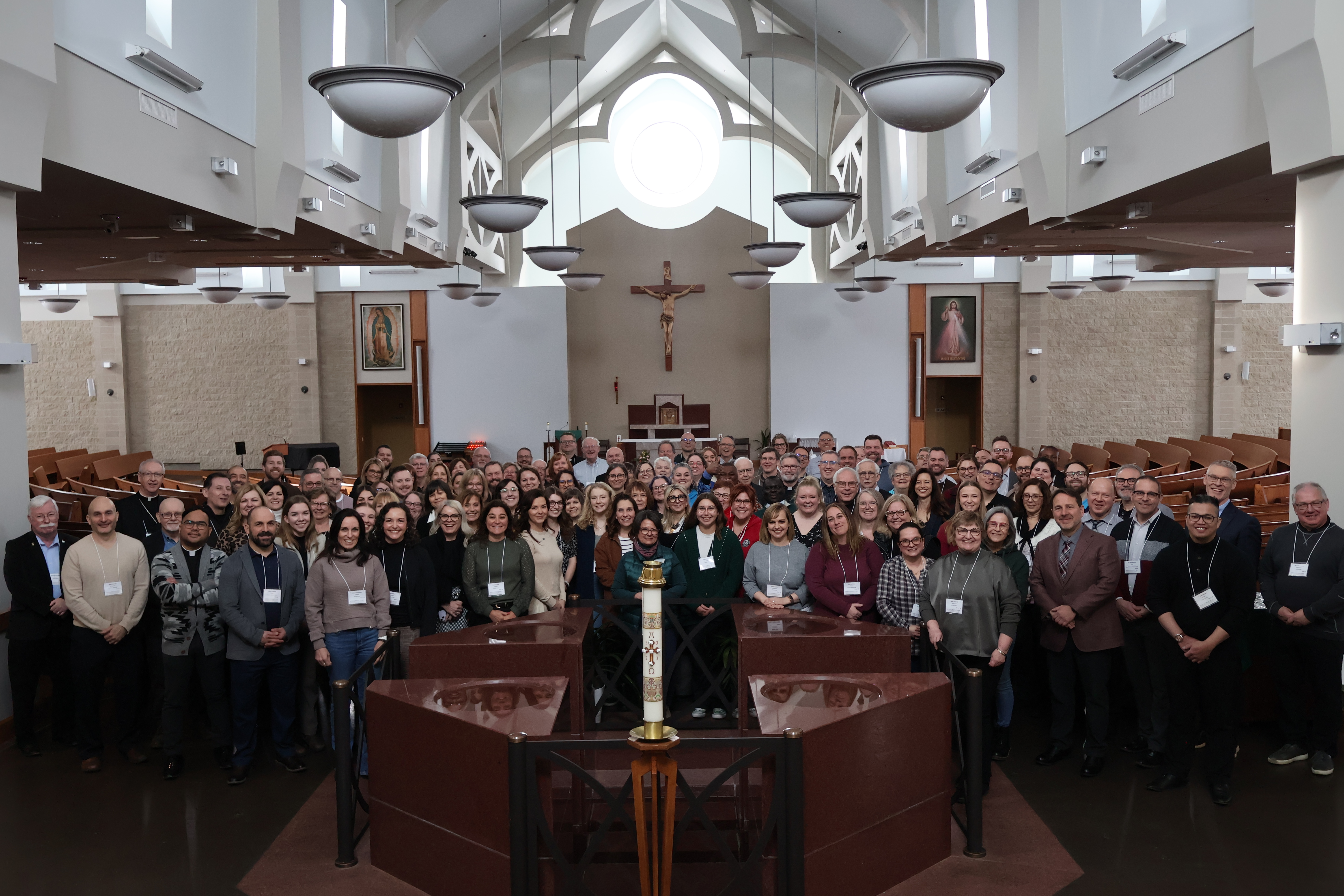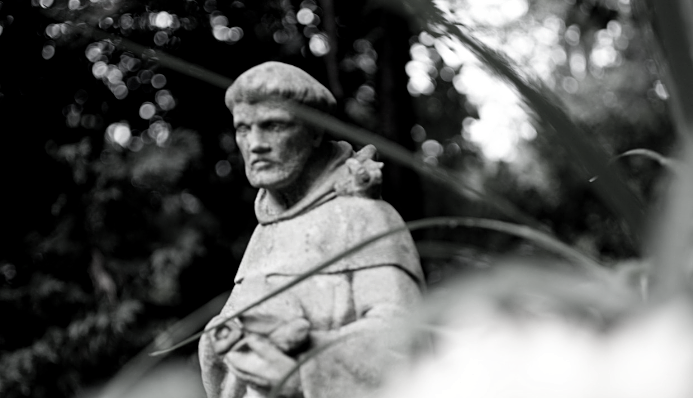Part I: Developing an Ecological Mindset for Catholic Education
As a teacher/chaplain in a Catholic high school, Earth Day was one of the few opportunities in the school year that I had to join the religious and spiritual teachings of the Church in a student driven movement, that was self-organized by them and engaged students in a meaningful manner that was not normally part of the organized spiritual life of the school. In ecology and environmental issues, the students and staff shared a common goal, vision, and values. This created an opening for the school staff to work with students; for Catholic teachings to address issues of faith and nature, spirituality, and ecology; and for the students to experience a convergence and collaboration of ideas between the secular and religious worldviews.
But are we forming teachers, both in-service and preservice, with the knowledge and the opportunity for spiritual and ecological conversion could greatly impact the students, families, and parish communities involved in Catholic education. As Catholic educational institutions, are we providing the knowledge and experiences necessary to make our schools, and teachers, ecological witnesses?
There’s been a growing recognition of the scale of modern environmental degradation, especially that caused by the climate crisis. Pope Francis has expressed concern about humanity’s failure to recognize the interconnectedness among the ecological and social challenges and the promotion of the common good. The Church has been a strong advocate of environmental and ecological issues for decades under the leadership of Popes Paul, John Paul II, Benedict XVI, and now Francis. Church members, especially religious orders, male and female, have strongly protested environmental destruction and have offered a theology and spirituality of creation and relationship, including the fight for the rights of Indigenous Peoples and the protection of their cultures and land.
Ecospirituality and the roots of the environmental movement grow deeply in the Catholic Church. Francis’s encyclical was one of many documents, teachings, and pronouncements by the Church on the integration of creation and humanity’s place within the world. Catholic schools and their teachers, as instruments of the Church and guided by CST, need to be formed in ecological awareness, informed of the issues and duties as citizens of the world, and personally transformed by ecological spirituality to become leaders in this movement. The call for environmental leadership and change is not new but is becoming increasingly louder and more urgent!
The final chapter of Pope Francis’ Laudato si’ directly addressed the role of ecospirituality, ecopedagogy, and religious education. The sixth chapter is vital to Catholic teachers, providing a means to enable teachers to incorporate climate change and environmental concerns in teaching, and infusing society with an environmental and ecological mindset. It is important that Catholic teachers understand the ecological movement, its complementary relationship to the teachings of the Church, and its power to spur dialogue in the public sphere.
Fr. Dermot Lane in his book “Catholic education in light of Vatican II and Laudato si” suggested that the final chapter of the encyclical relates three challenges that Catholic education faces in the 21st century (p. 47): (a) the encyclical’s critique of anthropocentrism, (b) the religious education challenge that the encyclical demands, and (c) the call for both an individual and a communal ecological conversion. I would like to touch on each of these three briefly.
1. Critique of Anthropocentrism
One of the encyclical’s central underlying themes is the need for a cultural change that embraces humanity’s common origin, mutual belonging, and a shared future with all creation. Francis suggested that, unless people modify and develop a new way of thinking about being human, no amount of education will change the current path, rendering education efforts ineffective. Francis declared, “There can be no ecology without an adequate anthropology” (para. 118). The encyclical uses strong language such as tyrannical (para. 68), distorted (para. 69), and misguided (paras. 118, 119, 122) to describe people’s anthropocentrism and the need for a change in anthropology.
Francis left no room for ambiguity. Going further than previous popes, he acknowledged that human beings cause climate change and that “once humanity declares independence from reality and behaves with absolute dominion”, creation will begin to crumble. Humanity must reorder itself—or decenter—and reconnect with the larger natural order. For Francis, this moment is both an anthropological and theological crisis, and humanity must attempt to reimagine its place within creation.
2. Educational Challenges provided by the Encyclical
Francis argues that education must address the lack of awareness of humanity’s common origins of creation, mutual belonging to each other, and the future that all creation needs to share.
Lane (2015) suggested that understanding the common origins of creation, beginning with cosmology and biological evolution, is necessary to contend with these issues. Religious education and teacher formation must help teachers and students recognize the place of human beings within the larger picture of creation. The fierce individualism and competitiveness of modern society contributes to the ecological devastation, especially the ubiquitous compulsive consumption found throughout the world.
Francis states the educational challenge includes going beyond exposing the “compulsive consumerism” of the free market economies of the globalized world, in which freedom is perceived as the freedom to consume and the failure to appreciate the reality that unlimited consumption is actually restrictive. Humanity has a responsibility to explore its relationship with objects and “things,” because people exploit and use nature in a destructive fashion. A world economy based on the unlimited consumption of finite resources creates and perpetuates an unhealthy relationship with the physical world: Francis quotes Pope Benedict “Purchasing is always a moral— and not simply economic—act”.
Pope Francis stated that the absence of humans’ self-awareness and self-reflection in the current ecological situation makes them incapable of offering guidance and direction. This absence becomes a source of anxiety that engenders feelings of instability and uncertainty, and the uncertainty can cause people to become even more “self-centered and self-enclosed”. Lane believed that we need a new vision of what it means to be human and regaining a sense of the place of humanity as part of creation is required.
3. A New Spirituality and Ecological Conversion
The last challenge is what the encyclical described as “the leap towards the transcendent which gives ecological ethics its deepest meaning”. Building on the work and thought of Pope John Paul II, Francis suggested, “So what they [those not committed to ecological change] all need is an ‘ecological conversion’”, whereby the effects of their encounter with Jesus Christ become evident in their relationship with the world around them. The Church has long taught that people need to live and create a “civilization of love” and expand it to a culture of care: “Care for nature is part of a lifestyle which includes the capacity for living together and communion. Jesus reminded us that we have God as our common Father and that this makes us brothers and sisters” (para. 228). The necessary love and respect are far beyond human relationships alone and include care for the environment and all creation.
The role of Catholic education in ecological conversion is essential. The encyclical called for two forms of conversion: a profound interior conversion and a conversion of the community. Central to this conversion is an encounter with Jesus Christ, which affects relationships with the created world. The task of conversion, difficult at the individual level, is the work of the community, with success possible only with a communal effort. Individual conversion requires the support of the community, and the community depends on the transformation of individuals.
Are our teachers and Catholic schools ready to lead this call to conversion? Do they have to be converted first? If so, how, and where?
Part II: Ecospirituality and Religious Education
Religious education curricula for Catholic schools are based on the goals of the Directory of Catechesis. The directory clearly states that, central to the education of youth in Catholic schools, themes “such as liberty, justice and peace and the protection of creation” are essential.
Canadian religious educator James Mulligan has referred to the notion of biasing the vision of Catholic education in schools. Social justice, including ecological and environmental concerns, should be a bias in Catholic schools. Catholic education must focus and form young people to understand the integral relationship among them, all living organisms, and all creation. This can only be achieved with teachers who themselves are formed and instructed in Catholic Social Teachings.
The pope’s call for ecological responsibility lies with each person and the institutions that form them, including the Catholic school and Catholic colleges that form teachers. He suggests that teachers need to reawaken the world, and their students, to the wonder and awe of the Earth so that they can truly encounter the universal connectedness and community that engages and sustains humanity. Teachers first must be awakened to reality before they can share this.
Educator and theologian Thomas Groome believed that Catholic schools play an integral role in leading students to an environmental consciousness:
"Pope Benedict XVI has been relentless in his call to unite ecological concerns with the Christian faith. This is as much a justice issue as a theological one. The practice of a “green” consciousness must be central to the Catholic school and formation of young people to preserve the environment and continue to recognize the sacramental nature of the Christian beliefs." (Groome, 2014, p. 216)
Catholic schools need to be justice-centered and committed to conservation, peace, and the environment. Social justice includes environmentalism and humanity’s relationship with all living things and the nonliving Earth. As sacramental communities, Catholic cosmology includes an awakening to people’s relationships with the biosphere, where God is revealed in the “awe, wonder and amazement” of creation and the diversity of life.
Education must also express the importance to youth and teachers of acting on environmentalism rather than just talking about it. Groome stressed that educators and strong curricula are crucial to an education that does justice: “If people come through a curriculum of Christian religious education and remain. . . negligent in their responsibilities. . . for the environment and ecology”, they have not been educated in Christianity.
Greening Catholic Teachers’ Formation
Groome wrote that a Catholic education should free the mind to search for truth; it should lead to the formation of students who live justly with a social conscience. He believed that every graduate from a Catholic school must leave with a commitment “to protecting the integrity of creation”. Unfortunately, CST are often seen as a secondary drivers in Catholic education curricula, including that found in many Catholic colleges; CST must be integrated more fully into the Catholic school and College and teacher formation in a tangible manner for a lasting impact. Witnesses are essential, and schools, governments, religious institutions all have a role to play. Developing teachers with the knowledge and skills to create initiatives that involve the environment and ecology, including human ecology, are important to the Church and society. These must be at the forefront of all Catholic education and teacher preparation.
Teachers’ formation in ecospirituality and environmental ethics, combined with the underlying anthropology that undergirds the Church’s position on creation and humanity’s place within, can potentially have two positive results. First, it can create a fresh new look at Christian teaching and facilitate a dialogue that impacts both the religious and nonreligious— both those who believe in the transcendent and those who live within an immanent frame. Second, in addressing the ecospiritual movement and the Catholic social justice tradition, a religious education in ecology can foster a common understanding or at least promote a more fully developed discussion of Christian anthropology and sacramentality.
In modern urban society, the natural world can be strange and distant. For sacramental churches, the division between humanity and creation has removed much of the innate symbolism of creation in sacramental rites. Yet, an ecologically centered perspective often sheds a different light on existence. God’s creation has nourished humanity and created a sense of kinship. Philosopher Charles Taylor explained that “we belong to the earth; it is our home. This sensibility is a powerful source of ecological consciousness”. Taylor also realized that at other times this alien and vast Earth can remind humans not only of their smallness, insignificance, and fragility, but also of the sense of mystery and enchantment.
The mission Catholic education is based in part on relationship, interconnectedness, and human ecology, I recommend that Catholic education place special emphasis on care for creation and ecospirituality in its curricula and teachers’ formation. Too often I have seen Laudato si’ and the pope’s messaging on care for creation reduced to a cliché: reuse, recycle, and reduce. While not discounting these actions, the reality is that Pope Francis’s and the Church’s teachings are much deeper and more powerful. Pope Francis wants humanity to reflect and renew its relationship with all creation intensely and profoundly. This broader viewpoint includes all human relationships.
Schools are ideal communities to form young people into universal citizens and at the same time instill within them faith and an ecospirituality. Teachers must be formed with the right balance of theology, science, and spirituality to recognize and interconnect with all aspects of creation. Pope Francis and the Church have provided a curriculum base and mission for Catholic education that enables Catholic educators to reach out to the secular community and begin a process of engagement and dialogue. Ecospirituality provides a language and a mission that the Christian community can use to engage and encounter the realities of global warming, climate change, rapid environmental change, and so on, and find connection, fullness, and human flourishing through this ecumenical issue.
Educational institutions, parishes, and Catholic schools need to educate all Christians, but especially teachers and other leaders in education, to the realities of CST and the work of the church in this field. This can only be accomplished through intentional efforts such as Courses, retreat programs, and professional development to sincerely understand and integrate CST and the message of care or creation, and Laudato si should be at the heart of these activities.










